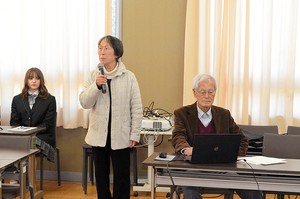By CHISATO MATSUMOTO/ Staff Writer
April 5, 2024 at 07:00 JST
A study released by the National Cancer Center Japan has revealed higher rates of mutations in a tumor-suppressing gene, TP53, in Japanese cancer patients compared to those in the United States.
The research team analyzed the cancer genomic profiles of 50,000 patients in Japan with 10 types of cancers, including colon cancer, bile duct cancer and head and neck cancer.
Until now, pharmaceuticals companies have developed cancer medicines largely based on data gathered in the United States and Europe, while comparable data for Japanese patients has been limited.
As a result, the study found that few treatments have been developed to attack the specific gene mutation in biliary tract cancer, which is more common in Japan than in America or Europe.
The research team expressed hope that these findings, released on Feb. 29, will help drug companies take the genetic characteristics of Japanese and other Asian cancer patients into account when developing medications.
“Our research showed that there are racial disparities in the mutations of genes,” said Keisuke Kataoka, chief of the Division of Molecular Oncology at the National Cancer Center Research Institute.
“I believe that the findings will pave the way for the development of new cancer drugs and for further studies while noting these differences,” he said.
The genomic profiles analyzed in the study had been collected in the National Cancer Center Japan’s database by Aug. 2023. The National Cancer Center Japan said that this is the first project in the country to uncover an overall picture of tumor-causing mutations across cancers, and one of the largest genomic analysis studies of cancers ever conducted in Asia.
Cancer is triggered by gene mutations that build up over time.
The recent research showed that missing or damaged TP53 genes were observed in 55.9 percent of the Japanese cancer patients studied, most frequently in those with bladder cancer or colon cancer.
The research team also compared the TP53 mutation frequency in the Japanese cancer patients to the mutation frequency in Caucasian patients with the same cancers in the United States, using data from the American Association for Cancer Research’s Genomics Evidence Neoplasia Information Exchange.
The comparison showed that TP53 mutations were more frequent in the Japanese patients than in the U.S. patients.
The analysis of the cancer genomic profiles of the Japanese patients also showed that drugs designed for specific gene mutations are available in only 15.3 percent of the cases.
Patients with thyroid cancer, breast cancer and lung adenocarcinoma have relatively easy access to these drugs.
However, patients with other forms of cancers have few options.
It is particularly the case with biliary tract cancer, a disease more common in Japan than in the United States or Europe.
Treating patients with drugs designed to home in on mutations identified by molecular-genetic information in their cancer cells has become a common approach in Japan in recent years.
In 2019, cancer genomic profiling tests became eligible for public health care insurance system coverage for patients in advanced stages of cancer, greatly increasing the use of the new therapy.
Information obtained through genomic profiling is expected to make it easier for doctors to prescribe drugs that might work best with patients.




















A peek through the music industry’s curtain at the producers who harnessed social media to help their idols go global.
A series based on diplomatic documents declassified by Japan’s Foreign Ministry
Here is a collection of first-hand accounts by “hibakusha” atomic bomb survivors.
Cooking experts, chefs and others involved in the field of food introduce their special recipes intertwined with their paths in life.
A series about Japanese-Americans and their memories of World War II